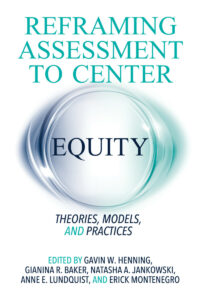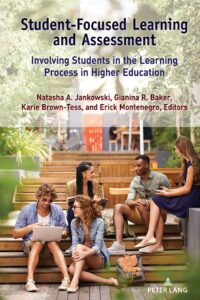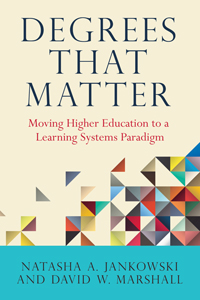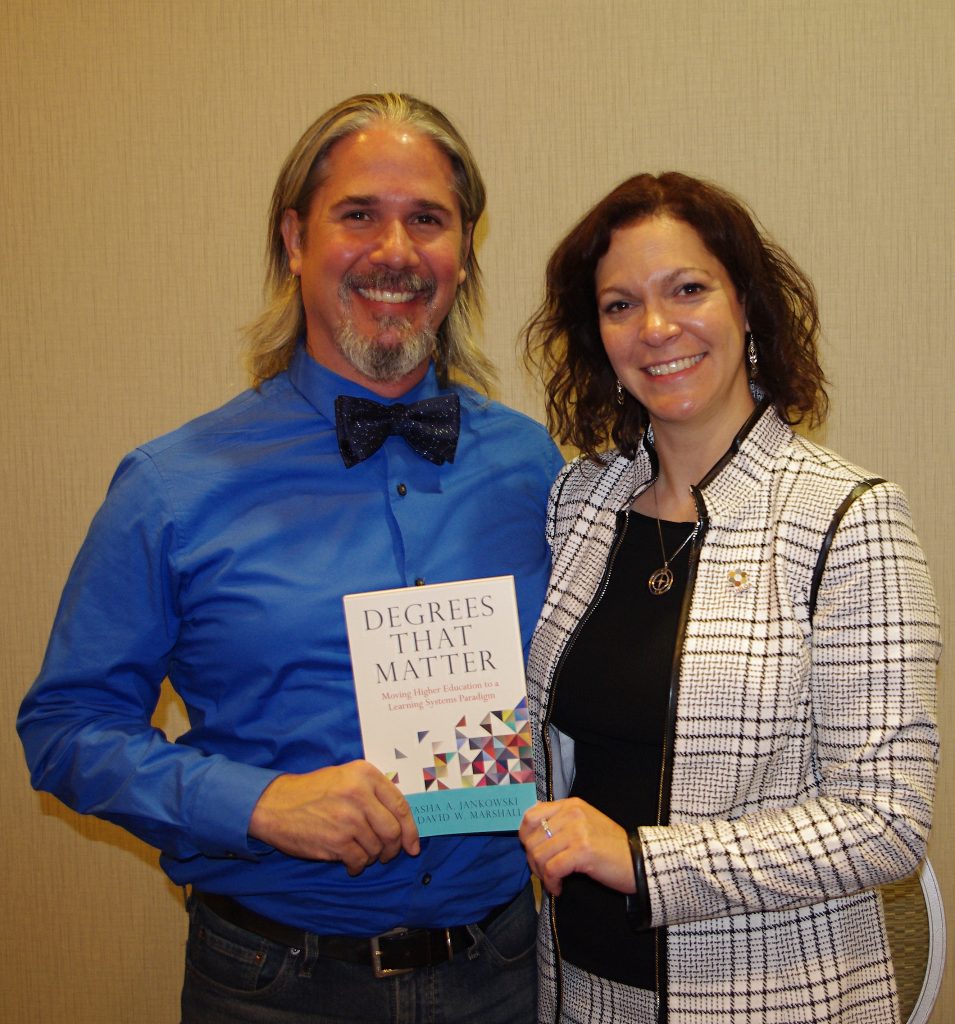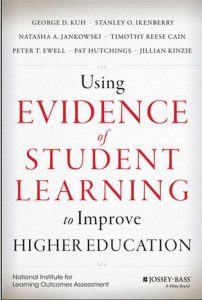NILOA Books
This book makes the case for assessment of student learning as a vehicle for equity in higher education. The book proceeds through a framework of “why, what, how, and now what.” The opening chapters present the case for infusing equity into assessment, arguing that assessment professionals can and should be activists in advancing equity, given the historic and systemic use of assessment as an impediment to the educational access and attainment of historically marginalized populations.
The “what” chapters offer definitions of emerging terms, discuss the narratives of equity in evidence of student learning, present models and approaches to promoting equity, and explore the relationship between knowledge systems and assessment practice.
The “how” chapters begin by progressively moving from the classroom to the program, then beyond the program level to share examples from student affairs. Subsequent chapters address the problem of equitable access to STEM fields; culturally responsive practices within the context of community colleges; the ongoing work of culturally situated assessment practices in Historically Black Colleges and Universities; and the role of technology-enabled assessment as a possible tool for equitable assessment.
x. Preface
Part I: Why?
1. Why the Intersection of Assessment and Equity?; Erick Montenegro and Gavin Henning
2. The Assessment Activist: A Revolutionary Call to Action; Divya Samuga_Gyaanam+Bheda
3. Equity and Assessment: A Storied Past; Natasha A. Jankowski and Anne E. Lundquist
Part II: What?
4. Current State of Scholarship on Assessment; Gianina Baker and Gavin Henning
5. The Varied Roles of Narratives and Stories in Assessment; Natasha A. Jankowski and Lesley D’Souza
6. Models and Approaches to Increasing Equity in Higher Education; Karen Singer-Freeman, Linda Bastone, and Erick Montenegro
7. Equity-Centered Assessment: Varying Approaches and Lenses; Stephanie Waterman, Gianina Baker, Gavin Henning, and Anne E. Lundquist
Part III: How?
8. Assessment in Class Meetings: Transparency Reduces Systemic Inequities; Mary-Anne Winklemes
9. Culturally Relevant Assessment: Examining Equity Gaps in Assignment Types; Harriet Hobbs and Christine Robinson
10. Centering ‘Āina in Assessment: Striving for Equity and Social Justice; Monica Stitt-Bergh, Charmaine Mangram, Eunice Leung Brekke, Kara Plamann Wagoner, Monique Chyba, Kaiwipunikauikawēkiu Lipe, & Siobhán Ní Dhonacha
11. Culturally Relevant Assessment 2.0 Through Faculty and Students’ Voices; Chiara Logli
12. The Need for Equity-Minded Assessment and Evaluation Outside of the Classroom; Juan G. Berumen
13. Advancing Equity in Student Affairs Through Assessment Practice; Ciji A. Heiser and Joseph D. Levy
14. Assessing Equitable Access to STEM Fields of Study; Alicia C. Dowd, Leticia Oseguera, and Royel M. Johnson
15. Equitable Assessment in Community Colleges: A Call for Collaboration and Culturally Responsive Practices; Raina Dyer-Barr, Kaylan Baxter, and Eboni M. Zamani-Gallaher
16. Cultural Awareness and Praxis: The Aesthetic of Teaching and Learning at HBCUs; Verna F. Orr
Part IV: Now What?
17. Leveraging Technology-Enabled Assessment Capabilities to Advance Students’ Achievement of Equitable Learning Outcomes for Equitable Assessment; Peggy L. Maki
18. Developing Individual Awareness: The Role of the Assessor; Danielle Acheampong, Marilee Bresciani Ludvik, and Anne E. Lundquist
19. An Invitation to a Beginning Rather Than the End; Divya Samuga_Gyaanam+Bheda , Natasha A. Jankowski, and Peter Felten
This contributed volume explores institutional and programmatic policies and practices which actively engage students as partners in improving student learning. This volume showcases student partnerships, as well as presents a history of institutional culture affecting student learning, the role of students in teaching and learning, and brings student voices and perspectives to bare through research from a variety of institutional types.
Part I: Setting the Stage
Introduction; Natasha A. Jankowski & Gianina R. Baker
1. Student Perceptions of and Involvement with Assessment in Higher Education; Natasha A. Jankowski & Emily Teitelbaum
2. Student-Faculty Partnership: A New Paradigm for Assessing and Improving Student Learning; Nicholas A. Curtis, Robin D. Anderson, & Sally Brown
Part II: Assessment in Practice
3. Giving Students a Voice in Assessment through Focus Groups; Samantha S. Gizerian & Elizabeth A. Carney
4. Student Assessment Scholars: Cultivating and Empowering Student Voice in Assessment; Rebecca C. Hong
5. Enabling Student-led Design of the Learning Experience; Luke Millard, Jamie Morris, Samuel Geary, & Stuart Brand
Part III: Reflecting on Practice
6. Designing a Co-Created Course: A Case Study of an Undergraduate Mathematics Teacher-Education Class; Karie C. Brown-Tess
7. Reviving a Lost Opportunity; Tyrone Martinez-Black
8. Elevating Creative Thinking; Aurora Berger
Part IV: Future Directions
9. Focus on Students and Equity in Assessment to Improve Learning; Erick Montenegro
10. Future Directions of Student-Focused Learning and Assessment; Gianina R. Baker & Natasha A. Jankowski
Concerned by ongoing debates about higher education, the authors of this book provide a means to move beyond these and other obstacles to improve student learning by building from research conducted with over 800 institutions of higher education. Offering an alternative to the culture of compliance in assessment and accreditation, a Learning System Paradigm is proposed, composed of four key elements: consensus, alignment, student-centeredness, and communication. The paradigm is applied to curriculum mapping and assignment design, barriers are explored along with communication needs to more effectively share stories of learning quality.
x. Introduction
1. Landscape of Learning Initiatives
2. Shifting Paradigms
3. Aligning for Learning
4. Applying the Paradigm to Curriculum Mapping
5. Applying the Paradigm to Assignment Design
6. Perceived Barriers in the Learning Systems Paradigms
7. Reframing Academic Quality
x. Introduction
1. Landscape of Learning Initiatives
2. Shifting Paradigms
3. Aligning for Learning
4. Applying the Paradigm to Curriculum Mapping
5. Applying the Paradigm to Assignment Design
6. Perceived Barriers in the Learning Systems Paradigms
7. Reframing Academic Quality
The scholars at the National Institute for Learning Outcomes Assessment (NILOA) present a reframed conception and approach to student learning outcomes assessment. The authors explain why it is counterproductive to view collecting and using evidence of student accomplishment as primarily a compliance activity. Today’s circumstances demand a fresh and more strategic approach to the processes by which evidence about student learning is obtained and used to inform efforts to improve teaching, learning, and decision-making. For assessment professionals and educational leaders, Using Evidence of Student Learning to Improve Higher Education offers both a compelling rationale and practical advice for making student learning outcomes assessment more effective and efficient.
x. Preface
1. From Compliance to Ownership: Why and How Colleges and Universities Assess Student Learning; Stanley O. Ikenberry and George D. Kuh
2. Evidence of Student Learning: What Counts and What Matters for Improvement; Pat Hutchings, Jillian Kinzie, and George D. Kuh
3. Fostering Greater Use of Assessment Results: Principles for Effective Practice; Jillian Kinzie, Pat Hutchings and Natasha A. Jankowski
4. Making Assessment Consequential: Organizing to Yield Results; Jillian Kinzie and Natasha A. Jankowski
5. Faculty and Students: Assessment at the Intersection of Teaching and Learning;Timothy Reese Cain and Pat Hutchings
6. Leadership in Making Assessment Matter; Peter T. Ewell and Stanley O. Ikenberry
7. Accreditation as Opportunity: Serving Two Purposes with Assessment; Peter T. Ewell and Natasha A. Jankowski
8. The Bigger Picture: Student Learning Outcomes Assessment and External Entities;Jillian Kinzie, Stanley O. Ikenberry and Peter T. Ewell
9. Assessment and Initiative Fatigue: Keeping the Focus on Learning; George D. Kuh and Pat Hutchings
10. From Compliance Reporting to Effective Communication: Assessment and Transparency; Natasha A. Jankowski and Timothy Reese Cain
11. Making Assessment Matter; George D. Kuh, Stanley O. Ikenberry, Natasha A. Jankowski, Timothy Reese Cain, Peter T. Ewell, Pat Hutchings, and Jillian Kinzie

